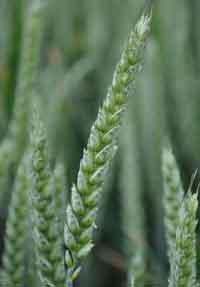Wheat varieties show large variations in alcohol yield

Researchers have found large differences in alcohol yield between wheat varieties of up to 22 litres/t of grain, which could see an extra 1102 litres of alcohol/ha.
These differences were discovered by researchers working on the HGCA Greengrain LINK project, which aims to identify the ideal wheat variety characteristics for high alcohol yield for distilling and bioethanol needs. They are also looking to develop wheat types which require less nitrogen fertiliser and are well-suited as animal feed.
One soft feed wheat variety – Denman – gave such positive results that it is being launched for C1 seed production this autumn. It is currently a Syngenta candidate Recommended List variety due for consideration for progression on to the Recommended List this winter.
Syngenta’s Tracy Creasy said: “It was the alcohol yield per hectare where Denman excelled, producing the highest figure out of 74 varieties tested at 3996 litres/ha.
“The project has relevance to both the alcohol drinks industry and bioethanol production because both share similar initial processing stages.
As well as potential distilling and bio-ethanol suitability, Denman is also a strong feed variety candidate in its own right, added Mrs Creasy, having performed well for yield over the last two seasons.
“It has excellent all-round disease resistance, is resistant to orange wheat blossom midge and wheat soil-borne mosaic virus, and is early-maturing similar to Claire. Our trials also indicate that it’s suitable for early drilling, and it was selected for its resistance to sprouting.”
Pointing to the nitrogen-efficiency side of the Greengrain project, Roger Sylvester-Bradley of ADAS explained that the reason for developing varieties which potentially require less nitrogen fertiliser is to reduce their carbon footprint.
Nitrogen uptake figures among 74 varieties screened in the project ranged from 161 to 184kg/ha.
The Greengrain project is sponsored by DEFRA and the Scottish Executive through the Sustainable Arable LINK programme, with additional funding from HGCA.

